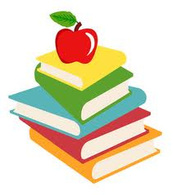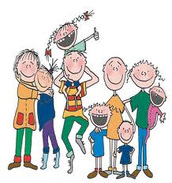READING COMPREHENSION POINTERS AND CONVERSATION STARTERS --
Check out the attached document at the bottom of this page. On the doc, you can find the reading comprehension strategies we are working on in class, all year long. You will find the strategy definitions, questions and stems that will help you converse with your child in a more specific and focused way. Help your kids practice their reading strategies!
Comprehension is the understanding and interpretation of what is read. To be able to accurately understand written material, children need to be able to (1) decode what they read; (2) make connections between what they read and what they already know; and (3) think deeply about what they have read. One big part of comprehension is having a sufficient vocabulary, or knowing the meanings of enough words.
Readers who have strong comprehension are able to draw conclusions about what they read – what is important, what is a fact, what caused an event to happen, which characters are funny. Thus comprehension involves combining reading with thinking and reasoning.
Check out the attached document at the bottom of this page. On the doc, you can find the reading comprehension strategies we are working on in class, all year long. You will find the strategy definitions, questions and stems that will help you converse with your child in a more specific and focused way. Help your kids practice their reading strategies!
Comprehension is the understanding and interpretation of what is read. To be able to accurately understand written material, children need to be able to (1) decode what they read; (2) make connections between what they read and what they already know; and (3) think deeply about what they have read. One big part of comprehension is having a sufficient vocabulary, or knowing the meanings of enough words.
Readers who have strong comprehension are able to draw conclusions about what they read – what is important, what is a fact, what caused an event to happen, which characters are funny. Thus comprehension involves combining reading with thinking and reasoning.
What the problem looks like
A kid's perspective: What this feels like to meChildren will usually express their frustration and difficulties in a general way, with statements like "I hate reading!" or "This is stupid!". But if they could, this is how kids might describe how comprehension difficulties in particular affect their reading:
|
A parent's perspective: What I see at homeHere are some clues for parents that a child may have problems with comprehension:
|
How to help
With the help of parents and teachers, kids can learn strategies to cope with comprehension problems that affect his or her reading. Below are some tips and specific things to do.
What kids can do to help themselves
|
What parents can do to help at home
|
Dear Parents, I can’t encourage you enough to talk to your kids about the learning they are doing in school! By asking your child questions, you allow them to more deeply process the learning they have been doing. If your children can explain their learning, that means they are understanding the material more deeply and thoroughly.
As well, by having conversations about school, you are showing your kids the value of school and learning. Hopefully, opening up communication with safe topics like curriculum will lead to deeper and more honest conversations between you and your child as they head into their adolescents. Remember, good questions are specific and have a purpose. Diane Levin, Ph.D., professor of education at Wheelock College says, "More than just finding out how their day was, we want to help kids become problems solvers and independent learners. Good conversations help kids see we care about their lives, that we are there to support them, and to help them develop strategies for solving problems themselves."
Check out this website for more information on talking with your kids: PBS
Check out this website for internet safety tips and games you can play with your child: Learning Lab
Sincerely,
Laura Marvin
Be on the lookout for information about talking to your children about their reading!
As well, by having conversations about school, you are showing your kids the value of school and learning. Hopefully, opening up communication with safe topics like curriculum will lead to deeper and more honest conversations between you and your child as they head into their adolescents. Remember, good questions are specific and have a purpose. Diane Levin, Ph.D., professor of education at Wheelock College says, "More than just finding out how their day was, we want to help kids become problems solvers and independent learners. Good conversations help kids see we care about their lives, that we are there to support them, and to help them develop strategies for solving problems themselves."
Check out this website for more information on talking with your kids: PBS
Check out this website for internet safety tips and games you can play with your child: Learning Lab
Sincerely,
Laura Marvin
Be on the lookout for information about talking to your children about their reading!


